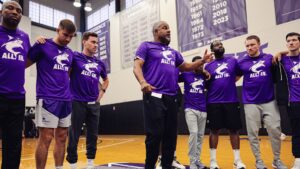Inside the K-State ‘Shark Week’ conditioning sessions
The Kansas State men’s basketball team recently completed its off-season conditioning program, affectionately dubbed “Shark Week.”Shark Week is eight hours across five days and features a bevy of conditioning drills to prepare the Wildcats for the Division 1 grind.

A recent feature story from K-State Sports offers insights into the Wildcats’ training tactics.
Below is an excerpt from the K-State Sports story.
It’s all-encompassing. It’s taxing. It’s Baier, already an early riser, in his element with every K-State basketball player at 6 a.m. And like we said, they undergo eight hours of training total during the week, or between 45 minutes to 90 minutes per morning session, so every moment is precious, and every line must be touched, and every hand must be clapped, or they’ll do it until it’s right because there can be no player heading home, head down, saying, “I didn’t win the day,” because that means nobody won the day, and that’s, well, that’s not even an option in Shark Week.
Shark Week, the brainchild of K-State head coach Jerome Tang. Shark Week, the brainchild of Jerome Tang, National Coach of the Year. Shark Week, the key to outlasting the other guys, the anchor to K-State going 5-0 in overtime games last season, including that 98-93 thriller over Michigan State to advance to the 2023 Elite Eight.
“There’s always Shark Week on the Discovery Channel,” Tang says. “We call it Shark Week because our guys are going to discover some things about themselves and each other.”
“I don’t want to dive into it too much because it’s family secrets,” Baier says. “But there’s time lengths on the floor and there’s ladders, which is a progressive deal where you go down-and-back and down-and-back and so on, and everyone in basketball runs that. We’ll have some variations of that. We’ll do some things that are a little different. We ran the hill this Shark Week. We had a certain distance they had to run and a certain amount of time to go up and down.”
Then there’s the holy grail to the entire week, the key to unlock the next level, the final obstacle before the start of official practice.
“Coach has the Championship Run, which is the hardest thing, and I’m not going to say what it is, but I can say there are 30 reps to it, and they have to get it done,” Baier says. “It’s a big deal. I have a hard time thinking the Championship Run will change. It’s a challenge. The guys have to come together. By any means necessary, they have to complete all their reps.”



